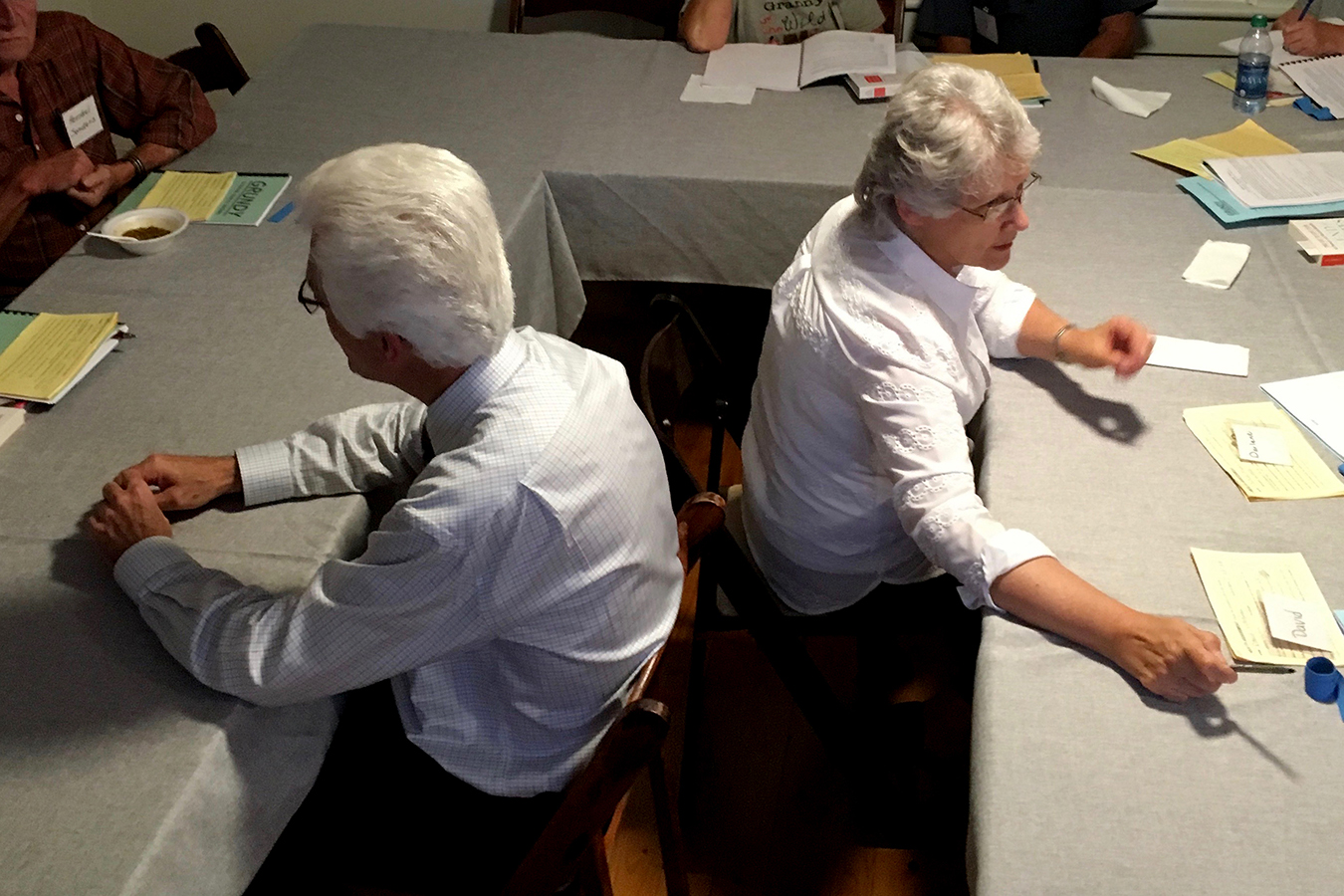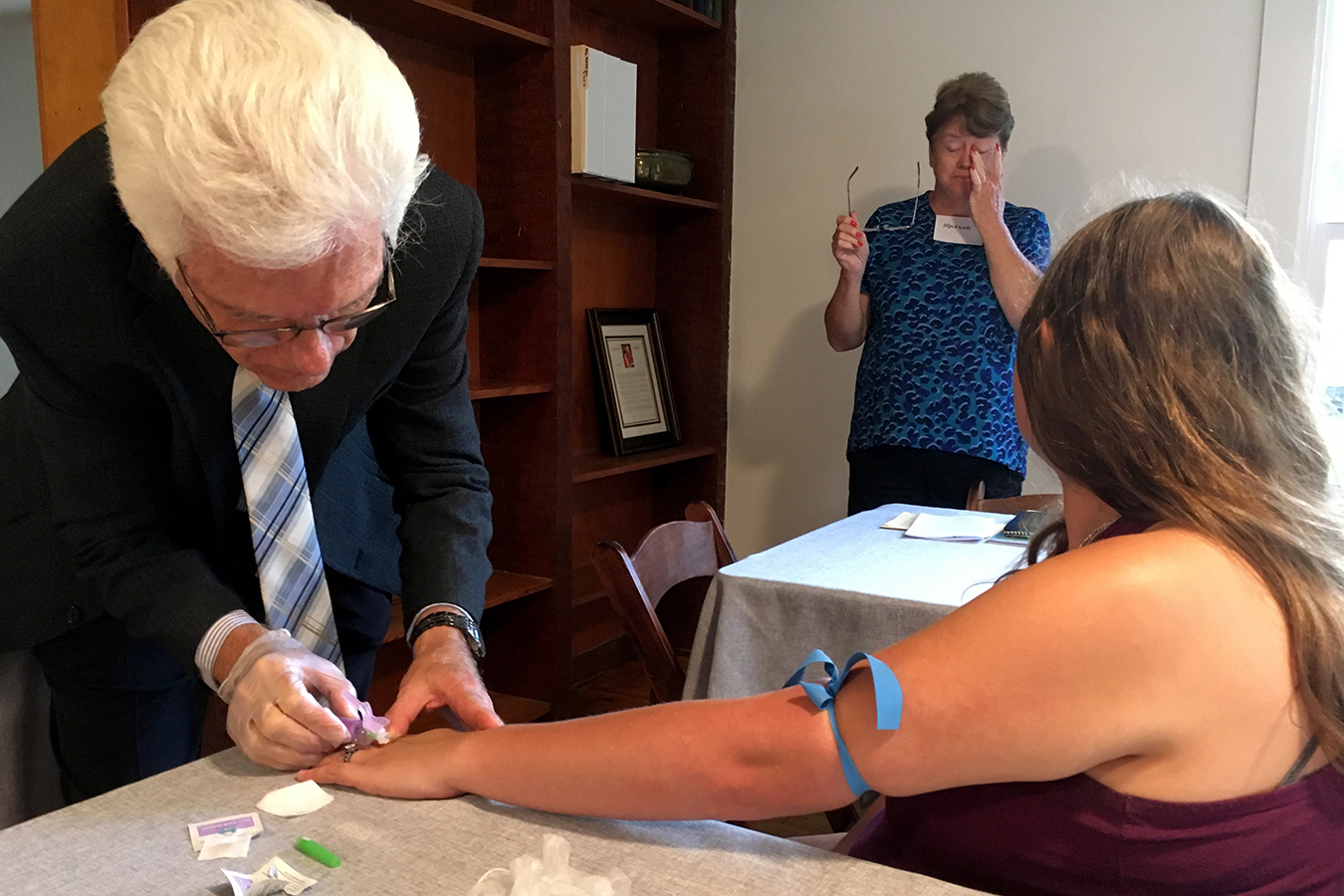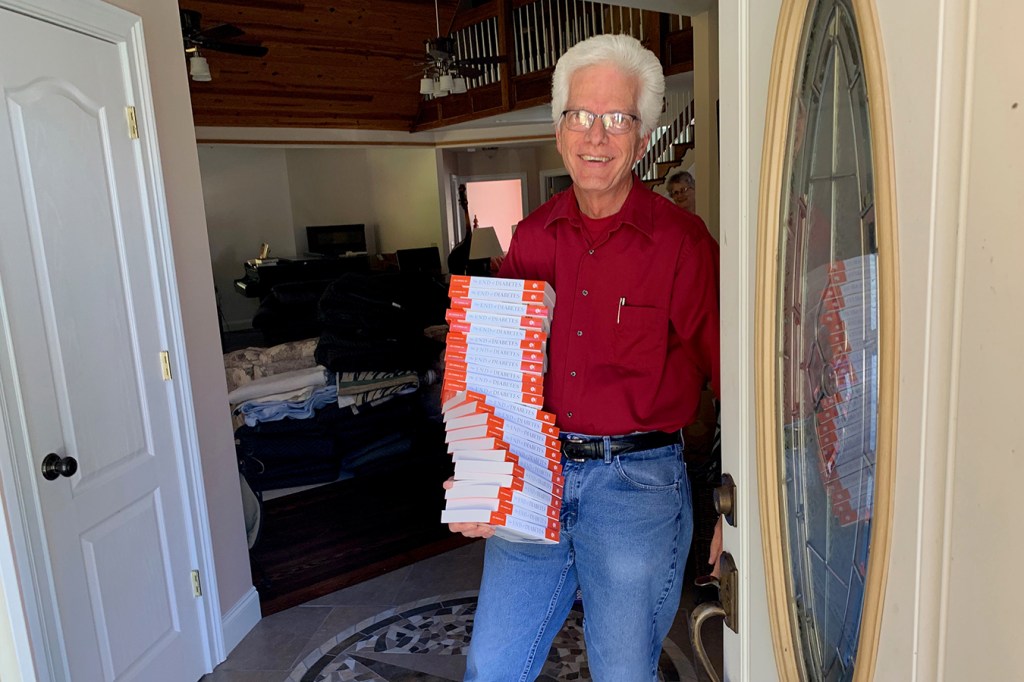In a former church parsonage in Grundy County, Tenn., Karen Wickham ladled out her lentil stew as people arrived for an evening health education class.
Wickham and her husband, Steve, are white-haired, semi-retired nurses who have dedicated the last years of their working lives to helping people with Type 2 diabetes control and even reverse the condition with diet and exercise.
Wendy Norris is in the group, and she has brought along her father and daughter. Since her diagnosis several years ago, Norris said, her doctor prescribed insulin shots and told her to watch what she ate.
She recalled thinking at the time, “Well, what does that mean?”
The Wickhams have set out to answer that question in Tennessee’s Grundy County, which ranks lowest on the scale of residents’ health. Grundy’s population of 13,000 has the shortest life expectancy in the state and an elevated rate of diabetes (16% of adults), which can eventually result in blindness, kidney failure or amputations.
Norris said trying to overhaul her diet by herself was confusing and difficult. And when things didn’t change, the doctor just kept increasing her dosage of insulin.
But then Norris lost her health insurance. The injectable insulin cost her hundreds of dollars a month — money she simply didn’t have.
“I felt like I was stuck having to take three or four shots a day [for] the rest of my life,” she said. She enrolled in one of the six-week seminars the Wickhams offer and is seeing results in how many shots she needs: “I’ve got it down to one already.”
With slide presentations, the Wickhams explain the difference between sucrose and glucose, and the science behind the fact that certain foods, like potatoes, spike blood sugar, while sweet potatoes don’t. They preach eating as much fiber as a stomach can stand, and dropping almost every kind of sweetened beverage.

Steve and Karen Wickham explain course materials to participants in their seminar on Type 2 diabetes in Grundy County, Tenn. The six-week seminar offers detailed instruction on the biology of diabetes, diet and exercise — and provides plenty of individualized support.(Blake Farmer/WPLN)
And they demonstrate ways to burn all those calories. Steve even invented the “Beersheba Boogie” — after the Grundy town of Beersheba Springs — asking participants to raise their knees and pump their fists while marching in place.
Support For Hard Changes
All the workshop participants have to find a way to get active at home or in a rugged state park nearby because there’s no gym anywhere in the county. There’s not a proper grocery store anywhere nearby either, so healthy cooking can become a real chore.
These communitywide obstacles reveal why it can be a struggle for people to maintain their health in rural America. But the Wickhams are working to overcome those barriers.
During one education session, as participants shared their latest health stats, Steve called out: “Her blood sugar is going down! Give her a hand.”
If it sounds like a revival meeting, it kind of is. Steve and Karen Wickham say they are compelled in this work by their Christian faith as Seventh-day Adventists — a denomination known for a focus on health. They first moved to Grundy County to take care of ailing parents, and once settled in their scenic mountain retreat, they grew disturbed by the suffering they saw in their neighbors.
“I think God holds us responsible for living in the middle of this people and doing nothing,” Steve Wickham said.
Many people think of Type 2 diabetes as practically incurable, though it has long been known that the condition can be reversed with weight loss and exercise. But research shows people need lots of help to change their lifestyle, and they rarely get it.
“I had taken care of diabetic patients for so long, and I knew the progression,” Karen said. “If you truly want the people to get better, you have to treat it with lifestyle interventions.”
Those changes can be hard to start and even harder to maintain.
“Nobody, actually, will make all of the lifestyle changes that we recommend,” Steve said. “But if you’re making the kind of choices that lead you to a healthier lifestyle, then you get better.”
A More Hopeful Message
Along with their lifestyle counseling, the Wickhams always give a disclaimer, advising people to consult with their doctors. They also acknowledge that their seminars are not yet “evidence-based” or backed by peer-reviewed scientific literature.
But there are studies showing that people with blood sugar levels in the “prediabetes” range can get back to normal blood sugar by losing 5% of their body weight.
And weight loss and exercise have already been shown to lower hemoglobin A1c levels, a test physicians use to monitor a patient’s blood sugar over two to three months.
In addition, new research from Dr. Roy Taylor of Newcastle University in England shows promise for true remission.
“Doctors tell their patients, ‘You’ve got a lifelong condition. We know it’s going to steadily get worse.’ Then they turn around and their patients aren’t losing weight or doing exercise, but they’ve given them this utterly depressing message,” he said.
Taylor’s research finds that by losing 30 pounds or so, Type 2 diabetes can be reversed in the early stages.
Ultimately, Taylor hopes, better nutrition will become the preferred response to high blood sugar in the next decade.
“I think the main headwinds [against progress] are just conceptual ones — of scientists and doctors believing this is an irreversible condition because of what we’ve seen,” he said.
Even the American Diabetes Association has been changing its views. The advocacy group has a new position on reversal:
“If a patient wishes to aim for remission of Type 2 diabetes, particularly within six years of diagnosis, evidence-based weight management programs are often successful.”
Dr. John Buse, chief of endocrinology at the University of North Carolina medical school, helped write the new position on reversal.
“We’ve known, literally since the 17th century, that diet is the key to managing diabetes,” he said.
But it’s hard to write a prescription for a lifestyle change.
“Doctors don’t have the time to do it well, so we have often used the sort of short shrift,” he said. “‘Eat less carbohydrates and walk every day’ … that has basically no impact.”
The Wickhams are doing their part to add to the scientific data, tracking the blood sugar of the participants in their program. And the anecdotal, short-term evidence they’ve gathered is resonating far beyond Grundy County. They’ve been traveling more and more lately.

Steve Wickham, who is a nurse, draws blood at the midpoint of his and wife Karen’s six-week diabetes seminar. The hemoglobin A1c levels measured by the lab test help patients monitor whether the diet and exercise changes they’re engaged in are making a difference in their blood sugar levels.(Blake Farmer/WPLN)
The couple just sold their retirement home so they can say “yes” to all the invitations they’ve received, mostly from Seventh-day Adventist groups, to present their program to other communities around the country.
This story is part of a reporting partnership that includes Nashville Public Radio, NPR and Kaiser Health News.







